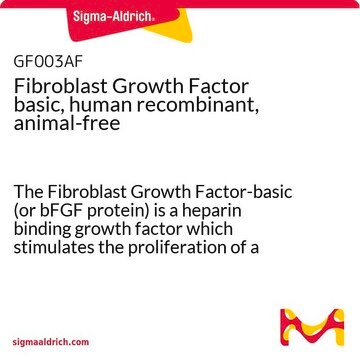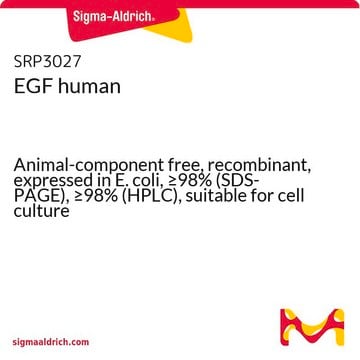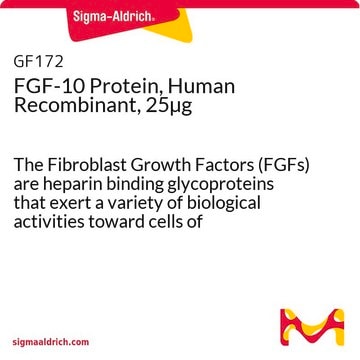01-106
FGF-2 / basic FGF Protein, Human recombinant
The FGF-2 / basic FGF Protein, Human recombinant is available in a 25 µg format.
Synonym(s):
Basic Fibroblast Growth Factor, Human FGF-2
About This Item
Recommended Products
biological source
human
Quality Level
recombinant
expressed in Saccharomyces cerevisiae
form
liquid
manufacturer/tradename
Upstate®
technique(s)
cell culture | mammalian: suitable
input
sample type: human embryonic stem cell(s)
sample type epithelial cells
sample type pancreatic stem cell(s)
sample type neural stem cell(s)
sample type mesenchymal stem cell(s)
sample type induced pluripotent stem cell(s)
NCBI accession no.
UniProt accession no.
shipped in
dry ice
General description
Application
Quality
Physical form
Legal Information
Disclaimer
Storage Class Code
12 - Non Combustible Liquids
WGK
WGK 1
Flash Point(F)
Not applicable
Flash Point(C)
Not applicable
Regulatory Listings
Regulatory Listings are mainly provided for chemical products. Only limited information can be provided here for non-chemical products. No entry means none of the components are listed. It is the user’s obligation to ensure the safe and legal use of the product.
JAN Code
01-106:
Certificates of Analysis (COA)
Search for Certificates of Analysis (COA) by entering the products Lot/Batch Number. Lot and Batch Numbers can be found on a product’s label following the words ‘Lot’ or ‘Batch’.
Already Own This Product?
Find documentation for the products that you have recently purchased in the Document Library.
Customers Also Viewed
Our team of scientists has experience in all areas of research including Life Science, Material Science, Chemical Synthesis, Chromatography, Analytical and many others.
Contact Technical Service










